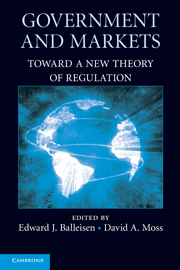Book contents
- Frontmatter
- Contents
- Acknowledgments
- Contributors
- Introduction
- SECTION I BEYOND MARKET FAILURE
- SECTION II BEYOND THE ECONOMIC THEORY OF POLITICS
- 6 The End of Special Interests Theory and the Beginning of a More Positive View of Democratic Politics
- 7 Public Choice: A Critical Reassessment
- 8 The Paranoid Style in the Study of American Politics
- 9 Law, Policy, and Cooperation
- SECTION III BEYOND COMMAND AND CONTROL
- Conclusion
- Index
- References
7 - Public Choice: A Critical Reassessment
Published online by Cambridge University Press: 20 January 2010
- Frontmatter
- Contents
- Acknowledgments
- Contributors
- Introduction
- SECTION I BEYOND MARKET FAILURE
- SECTION II BEYOND THE ECONOMIC THEORY OF POLITICS
- 6 The End of Special Interests Theory and the Beginning of a More Positive View of Democratic Politics
- 7 Public Choice: A Critical Reassessment
- 8 The Paranoid Style in the Study of American Politics
- 9 Law, Policy, and Cooperation
- SECTION III BEYOND COMMAND AND CONTROL
- Conclusion
- Index
- References
Summary
INTRODUCTION
The school of thought broadly known as public choice, emphasizing the pervasiveness of self-interested behavior in government, the capture of the state by private interests, and thus the pernicious influence of the government's role in the economy, has now been ascendant in academia for several decades. Arguments emphasizing the failures of government dominate the majority of both theoretical and empirical work undertaken in a variety of fields. On the other hand, studies that analyze or even define cases of policymaking success, or offer a theoretical rationale for government action, particularly in the economic realm, are rare and receive relatively little attention.
Accordingly, the dominant impression gleaned by the layman and the specialist alike is that a fairly wide consensus has been reached and the debate concluded: scholars have a clear and accurate understanding of the fundamental mechanisms of the operation of government and its intervention in the economy, as well as the consequences of that intervention. It is the contention of this chapter that, on the contrary, the dominant literature has ignored important critiques of the public choice theory of policymaking that highlight major weaknesses of the theory. Taken together, these critiques deserve far more attention than they have received.
Far from being a minor academic controversy, the validity or lack thereof of public choice is centrally important, shaping our views about the most fundamental of questions: not what the government should do to correct a perceived deficiency in the polity or economy, but whether the government has a role in resolving collective dilemmas at all.
- Type
- Chapter
- Information
- Government and MarketsToward a New Theory of Regulation, pp. 213 - 255Publisher: Cambridge University PressPrint publication year: 2009

